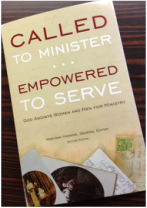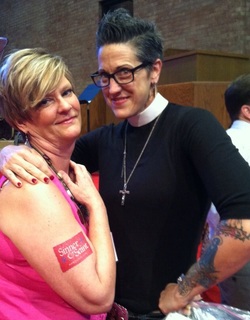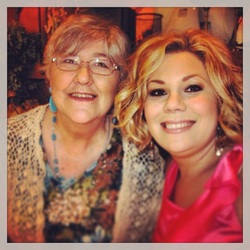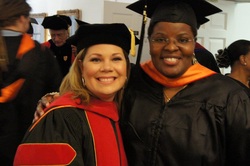|
|
 I was so honored to contribute to the anthology, "Called to Minister, Empowered to Serve" along with other female clergy and scholars whom I admire greatly. This book offers a biblical, historical, theological and ethical rationale for women in ministry in the voice of, from the perspective of and in the Spirit of women. Below you can read an excerpt from my chapter on Women in the Old Testament. "Called to Minister, Empowered to Serve" is now available in Kindle Edition at amazon.com In the pages of the Hebrew Bible we find beautiful imagery and noble typography, contours of women who have gone before us and left their mark. In the material known to us today as the Old Testament, we read of women who were prophets, military leaders, priests, wise women and wisdom personified. However, to study the lives of these women is no easy task. The reality is, the stories, as we have them are not handed down to us from the voices of the women themselves, rather what we have is an image rich narrative developed from a covenantal history, drawn upon the map of patriarchy. The narratives then, are primarily concerned with the public lives of men who are or are in some way related to the patriarchs and are connected to the emergence of the monarchy. It must also be stated that the narratives are also recorded, copied, edited and compiled by men who live many centuries after those women and men whose stories they are trying to convey. We must understand at the outset that the material we have existed first as oral tradition and communities were formed around story, many of these stories endured across the generations to be recorded during the compilation of the codices which are now considered canonical by persons of Jewish and Christian faith. To do these women any justice we must unearth information about their world, status, society and gender roles in ancient Israel. We are helped then to also consider archaeology and anthropological studies in concert with the Scriptures to gain a better picture of life in ancient Israel for women. In the Hebrew Bible, we find the stories of a people and a society who traverse the land of the Ancient Near East for more than 1,200 years (Murphy, Cullen: 1993). Of the 1,426 persons named within the narrative of the Old Testament, 111 of these named persons are women. While this seems like a small number, the witness of the lives of these women is powerful and their presence in this male dominated text reveals a prominence held by certain women. Though a casual reading of the Old Testament might leave us with the impression that women were confined to the domain of the home and their sole contribution was procreation, a closer look demonstrates another dynamic altogether. Mayer Gruber points out that women served as judges (Judges 4.4-5), officiated funerals as clergy (Jer. 9.16-19; 2 Chron. 35.25), slaughtered animals in priestly and domestic rites, served as prophetesses and sages (2 Samuel 14; 20.16-22), both nursed children and read Scripture in public settings (Gruber, Mayer: 1999). Gruber has also rightly demonstrated that within the Hebrew Scriptures we have accounts of women as priestesses (Exodus 38.8; 1 Sam. 2.22), poets (Exodus 15.21; Judges 5.1-31; Proverbs 31.1-9), musicians (Ps. 68.26), “queens, midwives; wet-nurses; babysitters; business persons; scribes; cooks; bakers; producers of cosmetics (I Sam. 8.13 ) as well as innkeepers and prostitutes (Josh.2).” While the scope of this study will not allow us to consider the 111 named women of the Hebrew Bible, we will take a representative group and trace their lives, their communal impact and their covenantal significance. We do this in effort to illuminate the reality that though the narrative of Hebrew Bible is primarily concerned with the lives of the patriarchs, there exists also a counter narrative that demonstrates the activity of God present and powerful in the lives of many women which reverberates through the nation of Israel for the good of the world. The group we will consider here is the women of the genealogy of Jesus offered in Matthew’s Gospel as each of these women emerge from the story of ancient Israel and the tradition of their contributions endure into the New Testament Canon and beyond. The narratives of these women, Tamar, Rahab, Ruth, and Bathsheba offer us traditions of women who were significant in the life of ancient Israel if also representatives of life in a given place and time who simultaneously rise from the narrative to demonstrate women as agents of God’s covenantal and universal work. Want to Read More...get your copy today!
0 Comments
 Photo courtesy of former student Rev. Teri Ditslear Photo courtesy of former student Rev. Teri Ditslear So here it is!! The much anticipated book list for my Finding Your Voice: A Course on Preaching Offered this summer online at Anderson University, beginning May 30, 2013. This course is open to Anderson University School of Theology students and non students. For more information on how to enroll click here. The course is dedicated to helping preaching persons develop skills in reading life and communicating grace; strengthening the spiritual muscles needed to sift through what seems mundane and profane in search of the sacred. This is an experience in shimmering words and haunting images where we acquaint ourselves with the groaning’s of this world and the need for visions of hope and light in our darkness. Barbara Brown Taylor, The Preaching Life (Lanham, Maryland: Cowley), 1993. George Martin, Game of Thrones: A Song of Fire and Ice, Book 1 (New York: Bantam), 2010. Lauren Winner, Still: Notes on a Mid Faith Crisis (New York: Harper), 2012 Will Willimon, Preaching Master Class: Lesson’s From Will Willimon’s Five Minute Preaching Class (Eugene, OR: Cascade), 2010 Texts will be augmented by numerous podcasts and primary sources from early mystics such as Hildegaard, Julian of Norwich, Teresa of Avila and John of Chrysostom. Students will experiment with different preaching styles in order to find the one that fits and work to understand the office of preacher as midwife, enduring with others to help them birth forth new life in hearts, homes, and communities.  I grew up avoiding the holiday altogether, spending the day with my mom and sister and friends at our local theme park. We would laugh, eat five dollar snow cones and stand in line for hours to get soaked in the rapids of the Grizzly River Rampage. My mom’s mother died suddenly at the age of 47, and for as long as I can remember the pain was too great to bear; the church service where the pink carnations were passed around in honor of Mother’s Day, the poems and the tributes left my mother’s already broken heart vanquished. Instead of donning corsages, we engaged in pure bliss; built new traditions out of the ashes, felt the sun warm on our skin and thanked God for the gift of each other. It has now been two years now since my sweet, strong, sassy mother passed on Mother’s Day and I am reflecting on how hard it is to face this day for so many of us whose mothers are no longer in this world, for those who long to have children but cannot, who have never known a mother’s love. I am no expert in grief, hold no degrees in loss and love but have lived it enough to want to share what I know. For my part, holding her hand while she drew her final breaths, being fully present with my Mother in her final moments as she had been with me in my first kicks and cries felt like a passage, entre into the wide circle of life, a birthing into full womanhood and the great privilege of my forty years. So as I look to this day, it only seems right to celebrate the gift of her, the goodness of her wisdom and to honor her legacy of love. Here are some helps I’ve learned along the path that might help you through: 1. Sew love: If there are others around you for whom this day is difficult for a myriad of reasons, invite them to join you for brunch. Eat, laugh and lift glasses, thank God for the goodness of family born in Christ Jesus and the bonds of brokenness that unite. 2. Celebrate feminine voice: Go hear a good woman preacher. Immerse yourself in images and the prophetic, poetry and prose of women who inspire, challenge and encourage you. Relish the gift of being born a woman, graced with the office of bringing forth, nurturing, embracing and releasing life. 3. Give thanks: Send notes, facebook posts, surprise text messages to all those girlfriends who run themselves ragged between board meetings and ball parks, who rock high heels and burp cloths; squeeze their babies, affirm their world changing call and work. 4. Plant goodness: Find the perfect rose or peony and set it in the dirt, press it down and drench it with water in memory or honor or in hope of what might come. Send bouquets to women who have stood in the gap, who have mothered you, loved and seen you through.  The end is near. These are the days of the last class, the last exam, the last of the cookies and cake; thanks be to God. Time now to pack your belongings and set out into the world armed with your call, equipped with education. These are the days when we dust off the cap and gown and wrap arms around you and wipe away the tears. This is where we speak a word of gratitude to you, whisper a prayer of thanksgiving for all the joy, hope and healthy tension you have brought into our lives; we embrace you and wish you well though we’d like to hold on for just a little while. We teach because we love to learn and you have taught us well. Your convictions buzzing around your head that you dared to speak, forbidden questions you found the courage to ask that caused us all to stretch and shake and know God; for this we give thanks. We honor you with tassels and golden cords; drape you in the scarlet of theology as if to wrap you in the full armor of God though we send you out not to do battle but to sew goodness and light. We pray that by our stamp and seal you will remember your hermeneutic is love that your priority is not fortune’s folly but those who are broken and bruised, crushed under the feet of this world who await the kerygma you sing with your life, and they will know you by your love. May the Holy Scriptures be your guide, not your idol nor your weapon but a testimony to the love that never fails, never ceases, endures beyond the grave. In the pages, worn and studied may you be reminded that you are never alone in your fear, in your doubt, in your struggle. May you be what Cain could not, the keeper of your brother and sister, the one who heeds the call of the prophets to remember the poor and will follow Christ to serve the least of these. As you exegete Scripture, remember also to exegete life, find time to reflect, to center, to pray; may you hear what the Spirit is saying to the Church. Look hard for grace and redemption where they can be found and call them out. Laugh loud, work hard and forgive yourself when you make mistakes. Remember the Shabbat, find a way to keep it, you need space for rest and trust in your life. As you go, remember this is your home, that in this place you found your way and that in these hallowed halls walk people who believe in you. |
Subscribe Today for Free GiftBLOG
Archives
June 2019
Categories
All
|

 RSS Feed
RSS Feed